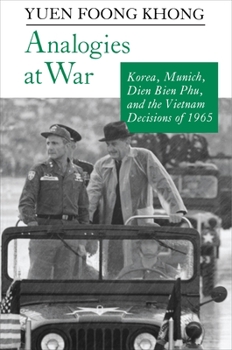Analogies at War: Korea, Munich, Dien Bien Phu, and the Vietnam Decisions of 1965
Select Format
Select Condition 
Book Overview
From World War I to Operation Desert Storm, American policymakers have repeatedly invoked the "lessons of history" as they contemplated taking their nation to war. Do these historical analogies actually shape policy, or are they primarily tools of political justification? Yuen Foong Khong argues that leaders use analogies not merely to justify policies but also to perform specific cognitive and information-processing tasks essential to political...
Format:Paperback
Language:English
ISBN:0691025355
ISBN13:9780691025353
Release Date:April 1992
Publisher:Princeton University Press
Length:304 Pages
Weight:1.00 lbs.
Dimensions:0.8" x 6.0" x 9.3"
Related Subjects
Asia Asian American History Korean War Military Politics & Government Southeast Asia Strategy Vietnam WarCustomer Reviews
2 ratings
Excellent work on Vietnam Decision
Published by Thriftbooks.com User , 16 years ago
Khong clearly and succinctly details the role of lessons from history, especially the 1930s, in the decision to escalate the war in Vietnam. His analysis is thorough, relying on archival research. In approach, it is similar to my Rolling the Iron Dice, which analyzes the use of historical analogies by British and American decision makers during four crises in the 1950s: Korea, Iran (1951-3), Suez and Lebanon-Jordan (1958). Both analyze the role of lessons from history, although my work also shows the types of leaders and situations, in which historical analogies are used.Rolling the Iron Dice: Historical Analogies and Decisions to Use Military Force in Regional Contingencies (Contributions in Military Studies)
Fascinating and Award Winning book on the Vietnam War!
Published by Thriftbooks.com User , 25 years ago
This book taking the political psychology approach analyse the events that led President Johnson to escalate U.S. involvement during the Vietnam War. Using "cold cognition -analogical reasoning", Khong explains with precision the decision-making process, why President Johnson increased U.S. participation in the Vietnam War but also the form it took during the few months in 1965. In terms of methodology, Khong make good use of interviews with participants of the decision-making process, in particular, George Ball and also memoirs of former statesmen for his analysis.The strength of the book lies in explaining how the option to escalate the war in Vietnam was arrived; through analogical reasoning by various participants of the decision-making process. Secondly, the form it took: the "slow squeeze" or incrementalism based on the last "lesson of history" of U.S. involvement in Korea. In short, Khong utilising the process tracing method, clearly links the decision- making process to the implementation/outcome of U.S. foreign policy.The weakness of the book is not that it does not consider other views why the U.S. was drawn into the Vietnam owing to "containment", "domino-theory" and U.S. credibility. Rather the author misses out on possible "reconciliation" between the analogical reasoning approach with that of the U.S. national interest approach. Nevertheless, a must read for those interested in other approaches to explain why U.S. escalated it's involvement in Vietnam apart from the "realist" paradigm and those interested in decision-making processes!





